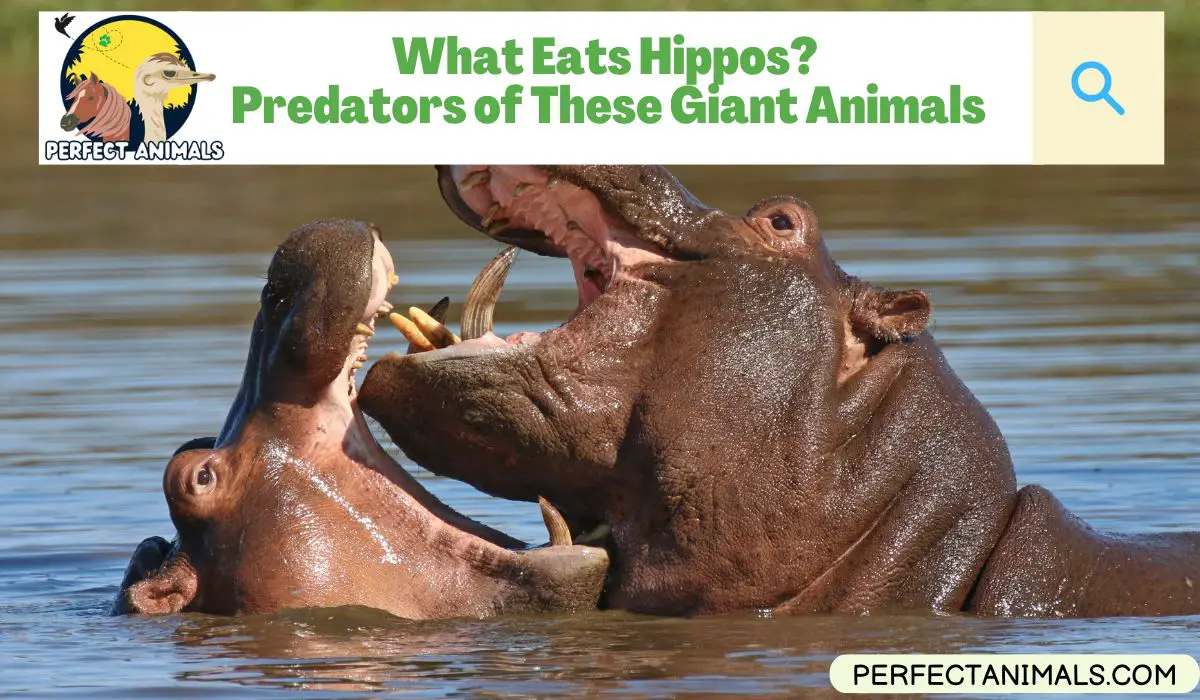Hippos are among Africa’s most recognizable animals, often seen lounging in rivers or lakes, their massive bodies partially submerged.
Known for their enormous size and surprisingly aggressive behavior, hippos are one of the most dangerous animals on the continent.
With their sharp teeth and powerful jaws, these animals can be deadly, which leads many to wonder: what eats hippos?
Despite their fearsome reputation, hippos do have predators, though only a few brave the challenge.
In this blog post, we’ll dive deep into the natural threats hippos face in the wild, from lions to humans, and explore the fascinating dynamics of these river giants’ lives.
Predators of Hippos
Although hippos are incredibly formidable, there are still animals and circumstances that can pose a danger to them, especially when they are young or vulnerable. Let’s take a closer look at some of their natural enemies.
Lions
Key Facts:
Lions, often referred to as the “king of the jungle,” are apex predators, and they occasionally turn their attention to hippos. But it’s important to note that while lions are capable of preying on hippos, these instances are rare and come with significant risks.
- Lions typically target young, sick, or old hippos. An adult hippo in its prime is simply too large and powerful for most lions to take on, even with their teamwork.
- A whole pride is required to take down an adult hippo. Unlike many of their other hunts, lions must work together to stand a chance.
- The risks are extremely high. Hippos have strong, thick skin and can crush bones with their bite. For lions, the potential for injury is substantial, so they generally avoid these confrontations unless desperate.
In most cases, lions prefer prey that’s easier to catch and kill, such as antelopes, zebras, or buffalo. Attacking a hippo, especially an adult, requires a considerable amount of energy and coordination.
Notable Example: In Zambia’s South Luangwa National Park, there have been documented cases where lions managed to take down a hippo.
These hunts typically occur in the dry season when food is scarce, and lions are forced to target larger, riskier prey.
Nile Crocodiles
Sharing the same rivers and lakes as hippos, Nile crocodiles are another predator that poses a threat, but only to younger or smaller hippos. Adult hippos are simply too large and aggressive for crocodiles to attack.
Key Facts:
- Crocodiles often go after baby hippos. If a calf gets separated from its mother, it becomes vulnerable to crocodile attacks.
- Adult hippos frequently kill crocodiles to protect their young. Crocodiles may attempt to sneak up on calves in the water, but adult hippos will aggressively defend their offspring, often killing the crocodiles in the process.
Interestingly, despite the animosity between the two species, hippos and crocodiles often coexist peacefully in the same rivers.
Crocodiles are fully aware of the consequences of angering a hippo and generally avoid direct confrontations unless there’s an opportunity to snatch an unguarded calf.
Fun Fact: Contrary to popular belief, hippos cannot swim. Instead, they move through water by walking along the riverbed or pushing off from the bottom.
Spotted Hyenas
Spotted hyenas are known for their scavenging habits, but they are also skilled hunters in their own right. Though they rarely hunt hippos directly, they may take advantage of certain situations, especially when the hippo is already weakened or dead.
Key Facts:
- Hyenas may scavenge on hippo carcasses. If a hippo dies due to natural causes, hyenas are often the first to arrive to feed on the remains.
- Packs of hyenas might attempt to attack young or weak hippos. Like lions, hyenas work in groups and will only attack a hippo if they believe it’s weak or vulnerable.
- Due to the danger involved, healthy adult hippos are almost always off-limits to hyenas. However, in some rare instances, they’ve been observed attacking weaker or smaller hippos, particularly at night when the hippos leave the water to graze.
You May Also Like – Can Crabs Swim?
Humans
Unfortunately, humans pose one of the biggest threats to hippos today. Over time, human activities have dramatically impacted hippo populations, both directly and indirectly.
Key Facts:
- Hunting for meat: In some regions, hippos are hunted for their meat, which can provide a significant amount of food.
- Ivory from teeth: Hippo teeth, though not as valuable as elephant ivory, are often used to make carvings, ornaments, and other decorative items.
- Habitat destruction: Human expansion, agriculture, and infrastructure development have led to the loss of wetland habitats, leaving hippos with fewer safe places to live.
The combination of hunting and habitat loss has put hippos at greater risk in some parts of Africa, with conservationists now working to protect these vulnerable populations.
Why Are Adult Hippos Hard to Prey On?
Adult hippos are rarely hunted by natural predators for several compelling reasons:
Size and Strength
Weighing between 3,000 to 8,000 pounds (1,400 to 3,600 kg), adult hippos are massive and incredibly strong. Their skin is nearly two inches thick, providing them with a natural armor against attacks. Combined with their raw physical power, this makes them an intimidating adversary for even the most skilled predators.
Aggression
Hippos are notoriously aggressive animals. They are highly territorial, particularly when in the water, and can be extremely dangerous if they feel threatened. With a bite force of around 2,000 pounds per square inch (psi), hippos can crush bones and cause severe injuries to any predator that dares to challenge them.
Social Structure
Hippos typically live in groups called pods or bloats, which can consist of up to 30 individuals. This social structure provides them with safety in numbers. Mothers are especially protective of their calves, and the entire group may act to defend the young from predators. This protective behavior further discourages predators from targeting them.
You May Also Like – Do Sea Turtles Drink Water?
Hippos’ Role in the Ecosystem
Despite their ferocity, hippos play a vital role in their ecosystem. They help maintain the balance of riverine environments in various ways:
Grazing Behavior: Hippos leave the water at night to graze on grasslands, sometimes traveling miles from the river. This grazing helps to shape the landscape, preventing overgrowth and promoting biodiversity.
Aquatic Contributions: Hippos spend most of their day submerged in water, and their dung contributes essential nutrients to aquatic ecosystems. These nutrients support fish populations and other aquatic life, which are crucial to the health of the rivers.
In this way, hippos act as both engineers of their environment and important contributors to the overall health of their habitat.
Wrapping Up
So, what eats hippos? The answer, as we’ve discovered, is not many animals. Lions, crocodiles, and hyenas may occasionally target young or weak hippos, but for the most part, adult hippos are simply too large and dangerous to be preyed upon. Sadly, humans remain their greatest threat due to hunting and habitat loss.
Despite their fearsome reputation, hippos are essential to their ecosystems. As both grazers and aquatic inhabitants, they play a crucial role in maintaining the balance of the rivers and grasslands where they live.
Protecting these river giants is not just about conserving a species but preserving the delicate environments they help sustain.
Final Hippo Fact: Hippos spend up to 16 hours a day submerged in water to keep cool in the African heat, but despite being so well-adapted to their watery homes, they cannot swim! Instead, they walk along the river bottom, pushing off to move through the water.
Resources – (for further reading)
Britannica – Hippopotamus | Size, Diet, Habitat, Evolution, & Images
Wikipedia – Hippopotamus
World Wildlife Fund – Hippopotamus | Species | WWF

Brittney , a devoted exotic pet enthusiast, showcases her profound passion for the animals through her role as a veterinary technician. With a strong background in caring for a diverse array of animals, she shares her expertise by crafting engaging articles about exotic pets for our blog.

